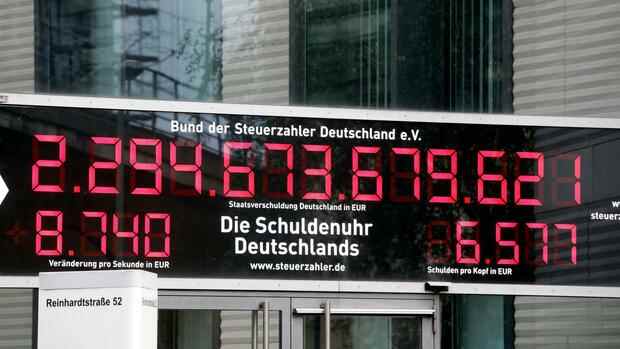Progressive government, eco-liberal reform government, progressive center. There is no lack of metaphors for exaggerating a traffic light coalition. The superstructure of the new government, the roof so to speak, is ready. Only the foundation on which everything else is based is not even in the making: a common budgetary policy.
Unlike their predecessor governments, the SPD, Greens and FDP find empty coffers and record debts. At the same time, the parties’ wish lists are long. Which is particularly stupid in the case of a traffic light. Because this time, the wishes of three parties have to be served, who were previously unable to work together. Money would be a good glue.
But money is not there, so it should be brought in, and through debts bypassing the debt brake, because it cannot be changed due to a lack of majorities. And so all sorts of suggestions are thrown on the market of ideas as to how the constitutional rule can be elegantly circumvented. The desperation is so great that even economists like Clemens Fuest take part.
State investment funds are particularly hip and have a majority. If they passed the debt brake, they could take on debt in order to finance investments. That sounds smart, and its economics creators had the best of intentions when they invented these funds. But politically they are a dangerous sham.
Top jobs of the day
Find the best jobs now and
be notified by email.
In the past few years, the federal budget has become more and more intransparent because new investment funds for daycare centers, municipalities or digital assets have been created all the time. But at least: So far, these funds have been located in the federal budget.
Red lines would be crossed
By creating shadow budgets, a government would cross that red line.
The state’s debts, crucial to the tax burden of the future, would be completely opaque to the electorate. But the traffic lights themselves run the risk of losing themselves on democratic astray and setting a bad example for other countries.
Because what is often overlooked: The European debt rules still drift above the national debt brake. According to this, debts do not fall under national rules such as the debt brake only if the state has less than 50 percent stake in special funds.
But when private investors have the say in investment funds, the question arises as to how the money from these funds should be passed out.
At the same time, there is a risk that investments will be outsourced to external funds in order to make room for higher social spending in the normal household. In any case, the spending requests are always greater than the investment requests, as the balance sheet of the grand coalition shows.
Parliament’s royal right would be undermined
The health and long-term care reforms were so expensive that the tax subsidy for health insurance threatens to double within two years and at the same time the federal government is getting into permanent tax support for long-term care insurance. A break in the system that receives far too little attention.
If investment funds were created, there would also be the risk of undermining Parliament’s royal right, the budget right. Parliaments could no longer fully watch over the federal budget, in the worst case even technocrats would have the say. This can already be seen in some communities today. There it is not the mayors who rule the municipal utilities, but the municipal utilities governing the mayor.
Even if all these problems could somehow be circumvented by means of legal loopholes, the signal would still be fatal. Of all things, Europe’s financial policy model boy would issue other euro countries a free ticket for getting into debt.
Because if Germany dares to outsmart its own debt rules, this can certainly not be denied to any other country. Anyone who rushes ahead can enjoy the discussion about reforming the Stability Pact right away.
Instead of trickery, transparency is required
Instead of trickery, budget policy needs transparency. This is neither puristic nor dogmatic, but rather in terms of democratic theory. If you want to get into more debt, you have to reform the debt brake. This requires less small-business and more ambition.
Olaf Scholz always talks about politics having to think in terms of missions. As Chancellor, he could go on a debt brake mission. A two-thirds majority was finally won for their introduction.
Investment funds, on the other hand, are not a good signal for a government to start. On the contrary: if a traffic light bases its policy on exploiting a budget loophole, it starts itself as a sham.
More: This is really how it is with the federal budget – and that is how much money the next coalition can distribute
